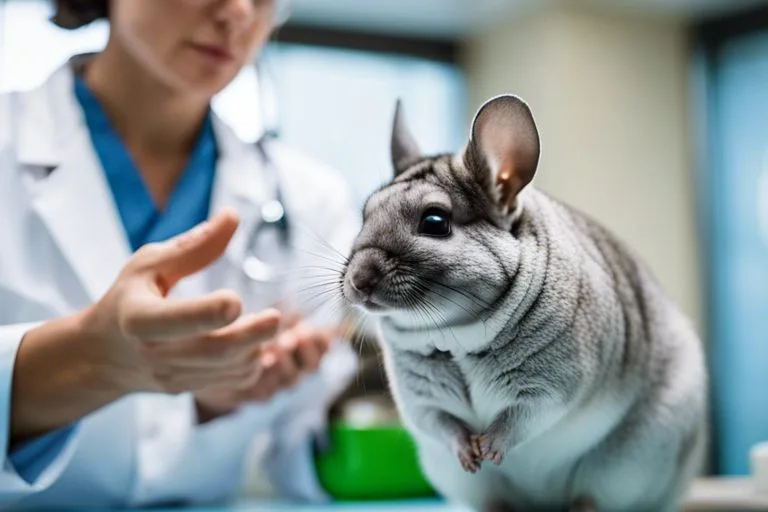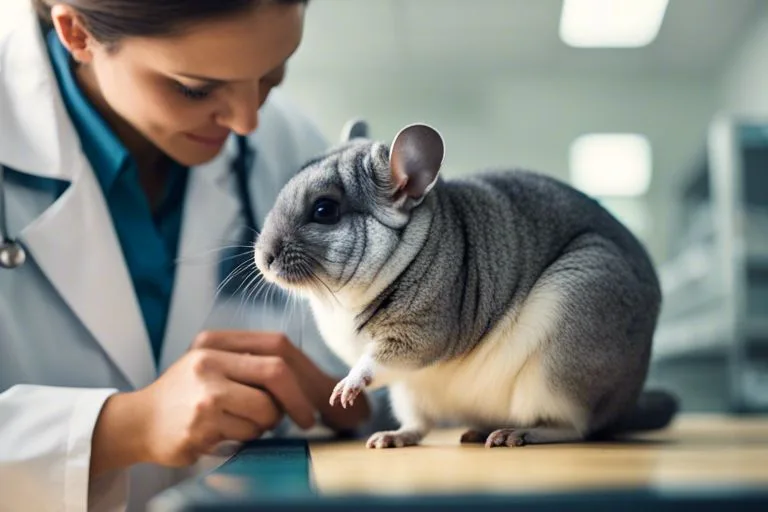Chinchillas, like other pets, are vulnerable to parasites that can impact their health and well-being. This guide covers everything you need to know about identifying and treating fleas, mites, and ticks in both adult and baby chinchillas. From symptoms and signs to treatment options and prevention strategies, you’ll find all the tools you need to keep your furry friends happy and healthy.
Key Takeaways
- Importance of Parasite Control: Regular inspection and treatment for fleas, mites, and ticks are essential for your chinchilla’s health.
- Signs of Parasites: Common indicators include scratching, hair loss, skin irritation, and visible parasites. Check adult and baby chinchillas regularly for these signs.
- Treatment and Prevention: Use safe, vet-recommended treatments for adult chinchillas, follow special care instructions for babies, and maintain a clean environment to prevent reinfestation.

How to Recognize Fleas, Mites, and Ticks in Chinchillas
Common Symptoms of Parasite Infestation
Parasites in chinchillas can cause symptoms such as excessive scratching, hair loss, scabs, and visible parasites on the skin. Watch closely for these signs:
- Behavioral Changes: Increased scratching, rubbing against surfaces, or hiding.
- Physical Changes: Fur appearing unkempt, patchy hair loss, skin scabs, and visible parasites.
- Health Indicators: Lethargy, decreased appetite, and weight loss.
Each parasite may present specific signs:
- Fleas: Small, dark spots that move quickly across the fur.
- Mites: Usually microscopic, but can cause red, irritated skin.
- Ticks: Appear as small, round bumps attached to the skin, often near the head or neck.
Checking Your Chinchilla for Parasites: Step-by-Step Guide
Regular checks are essential for early detection of parasites. Follow these steps to conduct a thorough inspection:
- Secure Your Chinchilla: Hold your chinchilla gently but securely in a well-lit area.
- Inspect with Tools: Use a fine-toothed comb, a magnifying glass, and a bright light to examine the fur closely.
- Examine the Fur and Skin: Comb through fur in small sections, looking for any movement, dark spots, or signs of irritation.
- Check High-Risk Areas: Pay close attention to areas around the ears, neck, and underbelly where parasites often hide.
Essential Tools and Techniques
- Fine-Toothed Comb: Helps to detect and remove fleas or mites from the fur.
- Magnifying Glass: Makes it easier to spot small parasites or eggs.
- Bright Light: A flashlight or bright lamp illuminates the skin, making parasites easier to see.
Treatment and Prevention Strategies
Safe and Effective Treatments for Adult Chinchillas
For adult chinchillas, treating fleas, mites, and ticks requires safe and effective solutions. Vet-prescribed treatments are recommended for the best results. Treatment options include:
- Topical Solutions: Safe, small-animal-approved products applied to the skin.
- Oral Medications: Vet-prescribed anti-parasitic medications to target internal parasites.
Always consult a veterinarian experienced with chinchillas before starting any treatment. Avoid over-the-counter treatments unless specifically recommended by a vet, as many products are unsafe for chinchillas.
Preventative Measures for Adult Chinchillas
Keeping the living environment clean and dry is essential to prevent parasites:
- Regularly Clean Cages and Bedding: Disinfect cages weekly using a non-toxic pet-safe disinfectant. Replace bedding with fresh, dust-free material.
- Control Contact with Other Animals: Keep chinchillas away from infested pets, and quarantine new chinchillas before introducing them to existing ones.
- Routine Inspections: Check your chinchilla weekly for early signs of parasites.
Special Considerations for Baby Chinchillas
Baby chinchillas have more fragile immune systems and may require gentler treatment options. Here’s how to care for young chinchillas:
- Gentle Treatment: Only use treatments approved by your vet, as young chinchillas are more sensitive to chemicals.
- Parasite-Free Environment: Ensure their cage is cleaned frequently and kept dry, with no exposure to other pets that may carry parasites.
For baby chinchillas, vet consultation is essential before any treatment, as they are more vulnerable to side effects than adults.
Maintaining a Clean, Parasite-Free Habitat
A clean environment is key to preventing parasite infestations. Follow these tips to keep your chinchilla’s habitat healthy:
- Regular Cage Cleaning: Disinfect the cage, toys, and accessories weekly with a non-toxic disinfectant suitable for chinchillas.
- Avoid Overcrowding: Give each chinchilla adequate space to reduce stress and prevent parasite transmission.
- Provide Proper Ventilation: Good airflow reduces humidity, which helps prevent mite infestations.
Maintaining clean cages and bedding along with good ventilation creates an inhospitable environment for parasites, reducing the chance of infestations.
Recommended Products and Practices for Ongoing Prevention
Consider using vet-approved products for long-term prevention and overall chinchilla health:
- Flea and Tick Preventatives: Ask your vet about safe options, as some dog or cat products may be harmful to chinchillas.
- Regular Grooming: Groom your chinchilla with a fine-toothed comb to remove any loose fur or parasites.
- Healthy Diet: A nutritious diet strengthens the immune system, making your chinchilla less susceptible to infestations.
For specific product recommendations, consult your veterinarian to ensure they’re safe for chinchillas.
When to See a Veterinarian
Parasite infestations in chinchillas can become severe, requiring immediate veterinary care. Seek professional help if you notice any of the following:
- Persistent Symptoms: Itching, hair loss, or irritation that doesn’t improve with home care.
- Severe Symptoms: Loss of appetite, lethargy, or excessive scratching.
- Uncertainty in Treatment: If you’re unsure how to treat an infestation, a vet experienced with chinchillas can provide specific guidance and treatment options.
Finding a Vet Experienced with Chinchillas
When choosing a vet, look for one with expertise in exotic pets, especially chinchillas, as their care requires specialized knowledge.
Conclusion
Maintaining a parasite-free environment and inspecting your chinchilla regularly are essential steps in ensuring their health. By recognizing signs of fleas, mites, and ticks, and using vet-approved treatment and prevention methods, you can keep your chinchilla healthy and comfortable. For severe infestations or persistent symptoms, don’t hesitate to seek professional veterinary care.
FAQ
Q: Why is parasite control important for chinchillas?
A: Parasite control is crucial to prevent discomfort, skin irritation, and potential disease transmission. Regular parasite checks and clean habitats maintain a healthy environment.
Q: What signs should I look for to identify fleas, mites, and ticks?
A: Common indicators include increased scratching, redness or irritation, visible parasites, hair loss, and behavioral changes. Regular inspections help with early detection and treatment.
Q: When should I see a vet for my chinchilla’s parasites?
A: Consult a vet if symptoms persist despite home care, if there’s a decline in health, or if you’re unsure of safe treatments. A specialized vet can provide tailored care for chinchillas.
Q: How do you treat mites in chinchillas?
A: Use vet-prescribed topical or oral anti-parasitics to treat mites in chinchillas, as over-the-counter options are often unsafe. Clean and disinfect the cage thoroughly to prevent reinfestation, and consult your vet for the best treatment options.
Q: Can chinchillas get fleas and ticks?
A: Yes, chinchillas can get fleas and ticks, though it’s less common than mites. To prevent infestation, keep their environment clean and consider using a vet-approved preventive if they are exposed to other animals.
Q: How do you check for fleas and mites?
A: Hold your chinchilla in a well-lit area, part the fur with a fine-toothed comb, and use a magnifying glass to look for dark spots (fleas) or irritated skin (mites), especially around the ears and neck. If you see signs, consult your vet.
